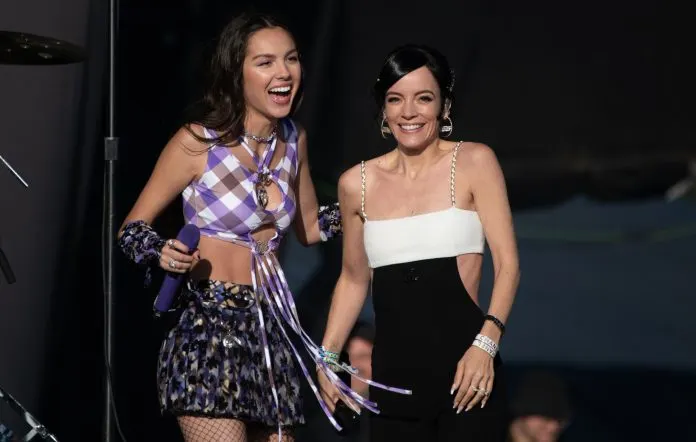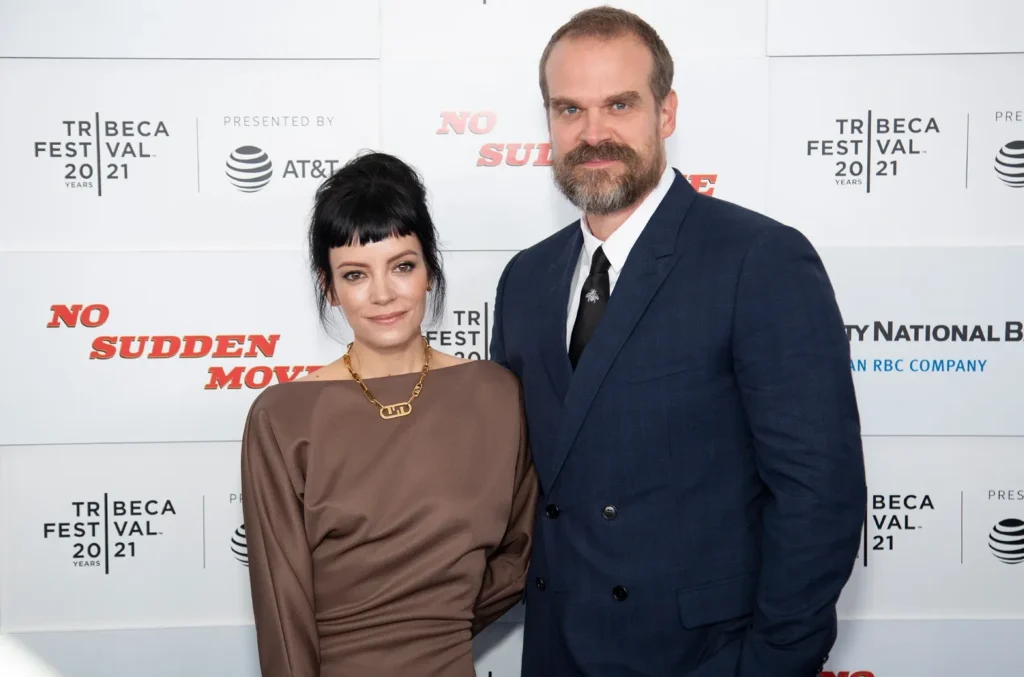For over two decades, Lily Allen has remained one of Britain’s most outspoken and unpredictable voices a singer, songwriter, actress, and cultural icon whose career has been anything but ordinary. Now, after years of stepping back from the music scene, Allen is back in the spotlight, not just with her sharp wit and fearless opinions, but with a bold new chapter: West End Girl. Her return to the stage marks not only a creative rebirth but also a deeply personal transformation that redefines what it means to make a comeback in your 30s and 40s.

A Decade of Ups, Downs, and Silence
It’s easy to forget that Lily Allen once ruled the UK charts. Her 2006 debut album, Alright, Still, turned her into an instant sensation. With songs like “Smile” and “LDN,” she became the voice of a generation that craved honesty, sarcasm, and a dash of rebellion. Her music wasn’t polished pop it was raw, funny, and often uncomfortably real.
The follow-up, It’s Not Me, It’s You (2009), showed growth and maturity, with hits like “The Fear” proving that Allen wasn’t just a tabloid headline; she was a songwriter with depth. Yet fame, family, and public scrutiny soon took their toll. By the mid-2010s, Lily had stepped away from the industry that once celebrated her.
After releasing No Shame in 2018 an album that blended vulnerability with electronic pop she went quiet again. For many fans, it felt like Lily Allen had closed the door on the music world for good.
Rediscovering Purpose on the Stage
Then came the surprise twist the West End. In 2021, Lily made her acting debut in 2:22 – A Ghost Story, a supernatural thriller that placed her in the heart of London’s theatre scene. Critics and audiences alike were stunned by her performance. For someone long associated with lyrics and controversy, Allen displayed remarkable stage presence and emotional control.
Her role in 2:22 wasn’t just a career experiment it was a statement. It reminded everyone that Lily Allen’s talent was far more versatile than anyone had given her credit for. The success of the play reignited her confidence and reshaped her artistic identity.
“I didn’t know I could act until I did,” she said in an interview. “The stage gave me something music couldn’t a place to just exist without expectation.”
West End Girl: The Reinvention of Lily Allen
West End Girl symbolizes Allen’s evolution not only as an artist but as a woman who has learned to balance fame with self-preservation. The title itself carries double meaning: a nod to her theatre success in London’s West End, and a reflection of her own roots as a London girl who has never lost touch with her authenticity.
This comeback isn’t about reclaiming chart dominance or viral fame. It’s about reconnection with creativity, with self-expression, and with the audiences who have grown up alongside her.
Unlike the Lily Allen of the late 2000s the one who threw verbal punches at the industry today’s Lily seems calmer, more introspective. Yet she hasn’t lost her edge. Her interviews remain unapologetically candid, her sense of humor still razor-sharp. What’s different now is her relationship with vulnerability: she’s learned to own it, not hide it.
Motherhood and Maturity
A huge part of Lily Allen’s reinvention has to do with her personal growth. As a mother of two and wife to Stranger Things actor David Harbour, Allen’s life today looks very different from her tabloid years. Her journey through addiction recovery, grief, and self-doubt has shaped her into someone who isn’t afraid to show imperfection.
Motherhood gave her a new lens through which to see both fame and identity. She’s spoken openly about the pressures women face in the entertainment industry to be flawless, to stay relevant, to stay young. But instead of bending to those standards, she’s rewriting the narrative.
“I’m 39,” she said recently. “I’ve lived many lives the pop star, the party girl, the mother, the wife, the actor. I’m not trying to be anyone else now.”
This version of Lily Allen feels grounded and self-assured. Her comeback isn’t fueled by the need for validation but by the desire for meaningful creation.

Balancing Acting and Music
While her theatre work has earned rave reviews, fans can’t help but wonder: will Lily Allen ever return to the recording studio? The answer seems to be yes but on her own terms.
In interviews, Allen has hinted at working on new material inspired by her recent experiences. Don’t expect another Smile or The Fear; instead, it’s likely to be something more personal, experimental, and reflective. The sound may evolve, but the honesty will remain unmistakably hers.
Interestingly, her time in theatre has also influenced how she approaches music. “Performing live every night taught me discipline,” she said. “It’s about control, about breathing, about storytelling all of which apply to songwriting too.”
That blend of theatre and music could define this new phase of her career. She’s not chasing trends; she’s building something lasting art that mirrors her evolution.
Fame, Reflection, and Self-Discovery
Lily Allen’s career has always existed in tension with fame. She was one of the first pop stars to grow up in the glare of social media, and she’s been refreshingly open about how toxic that world can be. Over the years, she’s confronted tabloid bullying, online trolling, and public shaming and survived it all.
Her recent interviews show a woman who has learned to detach from that chaos. Instead of trying to control her image, she’s embraced authenticity. Her podcast appearances and stage discussions show a candid, articulate thinker who’s not afraid to talk about difficult subjects from body image and mental health to addiction recovery.
This willingness to confront her past mistakes and turn them into lessons is what makes her comeback resonate. It’s not just about fame; it’s about healing.
Lily Allen and David Harbour: A Love Story Beyond Fame
Her marriage to David Harbour has also drawn attention for its unexpected charm. The couple met through a dating app, bonded over humor and mutual respect, and eventually married in 2020 in a low-key Las Vegas ceremony officiated by an Elvis impersonator.
Far from a Hollywood spectacle, their relationship seems refreshingly normal. In interviews, Allen describes Harbour as a stabilizing force someone who supports her ambitions while sharing her grounded sense of humor.
Their partnership has become one of the entertainment world’s most beloved surprises: a blend of British wit and American warmth that feels genuine in an industry often built on image.
The Message Behind Her Comeback
What sets Lily Allen’s West End Girl era apart is its emotional clarity. It’s not about proving she’s still relevant it’s about showing that reinvention doesn’t mean losing your essence.
Her story challenges the traditional narrative of a “comeback.” Instead of chasing youth or nostalgia, Allen embraces the reality of change. She’s proof that creativity doesn’t fade with age it deepens.
For fans who grew up listening to her, this evolution feels deeply relatable. Many of her listeners are now parents, professionals, and dreamers navigating their own transformations. Allen’s new chapter mirrors their journey messy, honest, and full of heart.

Cultural Relevance in 2025
As the entertainment landscape shifts, artists like Lily Allen stand out for their refusal to conform. While new stars chase TikTok virality, Allen represents something more enduring: authenticity. Her journey from pop rebel to West End actress speaks to an audience tired of manufactured perfection.
Moreover, her voice politically sharp, socially aware, and feminist remains as relevant as ever. In an era where women’s rights, mental health, and media ethics dominate public discourse, Allen’s experiences provide a valuable lens. She doesn’t preach; she relates.
Her storytelling whether in song, interviews, or theatre captures a generation’s shifting relationship with fame, femininity, and freedom.
What’s Next for Lily Allen
So, what lies ahead for Lily Allen? While she hasn’t confirmed a new album release date, whispers suggest she’s exploring both music and screenwriting. Her fans speculate that she might merge her theatre and musical talents into a stage project perhaps even a musical inspired by her own life experiences.
Whatever comes next, one thing is certain: Lily Allen is no longer the pop star who needed to prove herself. She’s the artist who already has. Her comeback isn’t a restart; it’s a continuation a narrative built on resilience, creativity, and unapologetic truth.
Conclusion: The Power of Reinvention
“Lily Allen’s Bold Comeback: West End Girl & New Beginnings” isn’t just a story about one woman’s return to fame it’s a blueprint for creative rebirth. Her journey reminds us that stepping away doesn’t mean giving up. Sometimes, silence is just preparation for a louder, more authentic return.
From rebellious pop anthems to haunting stage performances, Lily Allen continues to defy expectations. Her evolution is proof that reinvention isn’t about changing who you are; it’s about rediscovering why you started.
And as she stands again under the spotlight this time on her own terms Lily Allen shines not as the girl who sang “Smile,” but as the woman who finally found hers.